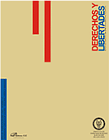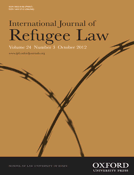
Age of Human Rights Journal
Scope & Guideline
Elevating Discourse in Law and Society
Introduction
Aims and Scopes
- Human Rights Legislation and Protection:
The journal examines the implementation and efficacy of human rights laws at national and international levels, addressing the legal frameworks that protect individual and collective rights. - Intersectionality and Social Justice:
It explores how human rights issues are influenced by intersecting factors such as gender, race, class, and sexuality, emphasizing the need for inclusive approaches to justice. - Global and Regional Human Rights Issues:
The journal delves into specific human rights challenges faced by different regions, including migration, refugee rights, and the impact of geopolitical conflicts on human rights. - Emerging Technologies and Human Rights:
It investigates the implications of technological advancements on human rights, including privacy concerns, digital rights, and the role of technology in facilitating or hindering access to rights. - Cultural and Historical Perspectives on Human Rights:
The journal incorporates discussions on the historical context of human rights issues and the cultural dimensions that influence the interpretation and application of rights.
Trending and Emerging
- Climate Change and Human Rights:
Recent publications increasingly address the intersection of climate change and human rights, emphasizing the need for human rights-based approaches to environmental protection and climate action. - Digital Rights and Online Freedoms:
There is a growing focus on digital rights, particularly concerning privacy, freedom of expression online, and the implications of misinformation and hate speech in digital spaces. - Rights of Marginalized Communities:
The journal is increasingly dedicated to exploring the rights of marginalized and vulnerable groups, such as refugees, LGBTQ+ individuals, and persons with disabilities, advocating for their recognition and protection. - Transitional Justice and Historical Accountability:
Emerging themes around transitional justice, including accountability for past human rights abuses and the role of truth commissions, are gaining traction as societies grapple with historical injustices. - Health Rights in Crisis Situations:
The impact of global health crises, such as the COVID-19 pandemic, on human rights is a trending topic, exploring issues like access to healthcare and the balance between public health measures and individual rights.
Declining or Waning
- Traditional Human Rights Defenses:
Discussions centered on conventional human rights defenses, such as the absolute nature of rights without contextual considerations, seem to be diminishing in favor of more nuanced and intersectional analyses. - Focus on Individual Rights Over Collective Rights:
There has been a noticeable shift away from discussions solely focused on individual rights, with less emphasis on collective rights issues, such as indigenous rights and community-based justice. - Legalism in Human Rights Approaches:
The journal has seen a decline in purely legalistic perspectives on human rights, with fewer articles that emphasize traditional legal frameworks without integrating broader socio-economic or cultural analyses.
Similar Journals

REVISTA REPUBLICANA
Fostering interdisciplinary insights into Latin America's socio-political landscape.REVISTA REPUBLICANA, published by CORP UNIV REPUBLICANA in Colombia, serves as a crucial platform for scholarly discourse in the fields of Law, Sociology, and Political Science. Since its inception in 2016, this journal has become a discussion point for emerging trends and critical analyses, reflected in its Q4 ranking in both Law and Sociology and Political Science for 2023. Although currently without an Open Access model, it offers insightful articles and research findings that contribute significantly to the academic community. With its ISSN 1909-4450 and E-ISSN 2256-5027, the journal aims to bridge knowledge gaps and foster interdisciplinary research among scholars, professionals, and students who are passionate about understanding the complex socio-political landscapes in Latin America and beyond. The journal's Scopus ranks, albeit modest, indicate its potential for growth and relevance within the global academic landscape, encouraging submissions that push the boundaries of current knowledge.

Washington International Law Journal
Illuminating the Path of Global JusticeWashington International Law Journal is a distinguished publication dedicated to the field of international law, published by the University of Washington. With an ISSN of 2377-0872, this journal provides a vital platform for scholarly discourse and critical analysis on global legal issues, ranging from human rights to trade law. Although it currently does not offer open access options, the journal aims to facilitate the dissemination of pioneering research and insightful commentary from leading scholars and practitioners in the field. It holds significant value for researchers, professionals, and students seeking to deepen their understanding of international legal frameworks and their implications worldwide. The journal’s commitment to fostering academic excellence positions it as an essential resource for anyone engaged in the dynamic landscape of law on an international scale.

Vox Juris
Fostering dialogue on contemporary legal issues.Vox Juris is a premier academic journal dedicated to the field of legal studies, published by the esteemed Universidad San Martin de Porres, Fondo Editorial. Since its transition to Open Access in 2015, it has significantly enhanced the dissemination of high-quality legal research and scholarship, providing unrestricted access to a wide audience of researchers, professionals, and students globally. Although the journal's H-index and specific scope are currently unspecified, it actively contributes to the discourse surrounding various facets of law, including theory, applications, and interdisciplinary perspectives. Located in the heart of Peru at SEDE LIMA JR LAS CALANDRIAS N0 151291 SANTA ANITA, Vox Juris serves as a vital resource for those seeking to explore and advance their understanding of contemporary legal issues. Its commitment to promoting scholarly dialogue makes it an indispensable platform for both emerging and established voices in the legal community.

Diritti Umani e Diritto Internazionale
Advancing Global Perspectives on Human RightsDiritti Umani e Diritto Internazionale is a distinguished journal that occupies a crucial role in the field of human rights and international law. Published by SOC ED IL MULINO, it serves as a reputable platform for scholars, practitioners, and students alike to explore and contribute to contemporary discussions surrounding human rights issues at a global scale. The journal aims to disseminate high-quality research and theoretical insights that address pressing legal challenges, thereby fostering a deeper understanding of human rights principles and their applications in various contexts. Though not currently an open-access publication, its rich content and rigorous peer-review process ensure that contributions meet the highest academic standards. With its ISSN 1971-7105 and E-ISSN 1972-5485, Diritti Umani e Diritto Internazionale stands as a vital resource for those committed to advancing knowledge in this essential area of study, ensuring that readers stay informed about the latest developments and debates in human rights law.

UNIVERSITY OF NEW SOUTH WALES LAW JOURNAL
Connecting Scholars, Professionals, and Students in Legal StudiesUniversity of New South Wales Law Journal, published by the University of New South Wales, Faculty of Law, is a leading academic journal that serves as an essential platform for discourse in the field of legal studies. With an ISSN of 0313-0096 and an E-ISSN of 1839-2881, the journal has been a beacon of legal scholarship since its inception in 1983. Operating from Kensington, New South Wales, Australia, it provides profound insights into various legal issues, emphasizing interdisciplinary perspectives by also being recognized in the fields of philosophy, sociology, and political science. While it maintains a Q3 ranking in Law and has shown increased visibility in Philosophy at Q2 according to the 2023 category quartiles, the journal assures a diverse range of critical analyses from scholars, professionals, and students alike. It is particularly valuable for researchers seeking to engage with contemporary legal debates, ensuring they remain at the forefront of academic and practical discussions in law and related disciplines.

Novum Jus
Connecting ideas that influence contemporary legal discourse.Novum Jus is a prominent academic journal dedicated to advancing knowledge in the fields of Law, Sociology, and Political Science. Published by UNIV CATOLICA COLOMBIA, FAC DERECHO, this open-access journal has been providing a platform for scholarly communication since 2008, making valuable research freely accessible to readers around the globe. With an impressive impact reflected in its 2023 category quartiles—Q1 in Law and Q2 in Sociology and Political Science—Novum Jus is ranked favorably within Scopus, standing at #479 out of 1025 for Law and #823 out of 1466 for Sociology and Political Science, indicating its significant contribution to the academic community. The journal aims to foster interdisciplinary dialogue and disseminate innovative ideas that shape contemporary legal and social landscapes, catering to researchers, professionals, and students alike. With its commitment to quality and rigorous peer review, Novum Jus remains an essential resource for those engaged in the evolving dynamics of law and society.

African Disability Rights Yearbook
Illuminating Challenges, Inspiring Change.African Disability Rights Yearbook is a peer-reviewed journal dedicated to advancing scholarship and dialogue surrounding disability rights within the African continent. Published by PRETORIA UNIV LAW PRESS, this journal plays a critical role in exploring legal, social, and political issues affecting people with disabilities, aiming to promote inclusion and empower communities through rigorous academic research and advocacy. The Yearbook serves as a vital resource for researchers, practitioners, and policymakers, offering accessible insights and empirical evidence to inform disability rights discourse, policymaking, and legislative reform. Utilizing both qualitative and quantitative approaches, the journal highlights innovative legal frameworks and best practices while fostering collaboration within the interdisciplinary fields of law, sociology, and public health. As an essential tool for those committed to advancing disability rights, the African Disability Rights Yearbook invites contributions that enrich the understanding and implementation of these crucial issues across Africa.

Derechos y Libertades
Connecting scholars to amplify the fight for liberties.Derechos y Libertades is a well-regarded academic journal published by the Universidad Carlos III de Madrid, Instituto de Derecho y Economía, focusing on the fundamental areas of human rights and civil liberties. Since its inception, this journal has aimed to advance scholarly discourse by providing a platform for high-quality research, critical analysis, and innovative perspectives in the fields of law and economics. Transitioning to Open Access in 2021, it now reaches a broader audience, allowing researchers, professionals, and students unrestricted access to its articles, thus promoting the dissemination of knowledge and fostering collaboration within the academic community. With its commitment to excellence and relevance, Derechos y Libertades serves as an essential resource for those engaged in the study and advocacy of human rights, striving to influence policy-making and societal change.

Dixi
Exploring the Rich Tapestry of Humanities and Social SciencesDixi is an esteemed academic journal published by UNIV COOPERATIVA COLOMBIA, focusing on a wide range of disciplines within the humanities and social sciences. Since its transition to Open Access in 2012, Dixi has committed to democratizing knowledge by providing a platform for researchers and scholars to disseminate their findings without barriers. The journal is dedicated to fostering interdisciplinary dialogue and is particularly well-regarded for its contributions to cultural studies, sociology, and educational research. Located in Bucaramanga, Santander, Colombia, Dixi aims to engage a global audience of researchers, professionals, and students eager to advance their understanding of complex social issues. With its accessible format and commitment to rigorous peer review, Dixi is a vital resource for those seeking to enrich their academic work and influence contemporary discussions in their respective fields.

International Journal of Refugee Law
Shaping the future of refugee studies and legal frameworks.International Journal of Refugee Law, published by Oxford University Press, is a leading peer-reviewed journal that has significantly contributed to the field of refugee studies since its inception in 1989. With an ISSN of 0953-8186 and an E-ISSN of 1464-3715, this journal provides a vital platform for interdisciplinary dialogue on issues related to migration, asylum, and the legal frameworks that govern refugee rights. It holds an impressive reputation within the academic community, as evidenced by its 2023 category quartiles—ranking Q2 in both Demography and Law, and Q3 in Management, Monitoring, Policy, and Law. Additionally, it boasts notable Scopus rankings, positioned in the 66th percentile among Law journals and the 50th percentile for Demography, indicating its relevance and impact. Researchers, professionals, and students engaged in these fields will find invaluable insights through its rigorous analyses, case studies, and policy discussions, albeit it operates under a traditional subscription model without open access. As the journal continues its mission through to 2024 and beyond, it remains instrumental in shaping discourse and understanding of contemporary refugee law, ensuring it is a must-read for anyone invested in the social sciences and legal studies.